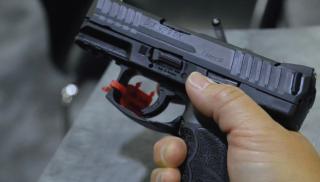Criminal Justice, Master's
Criminal Justice, Master's
The criminal justice field has numerous opportunities, with projected growth over the decade. And these jobs don’t always require an advanced degree. So why pursue a M.S. in Criminal Justice? Not only can a master’s degree provide broad knowledge and specialized technical training, but it can also prepare you for leadership roles and responsibilities.
We’ve designed coursework to increase individual ability and knowledge, as well as to develop analytical thought. Coursework examines contemporary issues in the administration of justice, counseling, crime control and delinquency prevention, as well as research and management challenges in criminal justice and correctional education.
Learn how to:
- Communicate effectively through oral and written formats
- Apply criminological theories, logic, and qualitative as well as quantitative analysis to criminal justice policies and issues
- Demonstrate awareness of the social, political, cultural, and historical factors that influence the field of criminal justice
- Make positive contributions to the field of law enforcement in law enforcement, court and/or correctional settings

750+ Course Options
The Coppin State University Academic Catalog has a wide variety of skill-building courses designed to inspire and prepare you to be in-demand professionals and transformational leaders.
Specialize Your Skills
The M.S. in Criminal Justice program has several areas of specialization, including:
- Administration
- Correctional counseling
- Crime control and delinquency prevention
- Criminal justice planning and research
The program complements the course curriculum through partnerships with federal, state, and local facilities, allowing graduate students to gain real world value. Coppin’s location in the Baltimore metropolitan area also allows you to take advantage of numerous field training, internship and cooperative education opportunities.
Graduate Course Load Expectations
Graduate students may enroll in the M.S. in Criminal Justice on a full- or part-time basis. A full-time course load is 9 credits per semester. Students also have an option to enroll in a part-time course load of 6 credits per semester.
Program Requirements
To graduate with a Master of Science in Criminal Justice, students must complete 33 credits in:
- Core courses (12 credits for non-thesis students or 18 credits for thesis students, not including EDUC 581 3 credits)
- Content area courses (12 credits)
- Capstone and elective courses (9 credits)
Each chart in this section explains course offerings and requirements
Core Courses (12-21 credits)
| Course | Credits | Name |
|---|---|---|
| EDUC 581 | 3 | Statistics in Social and Behavioral Sciences |
| EDUC 582 | 3 | Research Methods |
| CRJU 554 | 3 | Survey in Criminal Justice Administration |
| CRJU 559 | 3 | Review and Evaluation |
| CRJU 563 | 3 | Advanced Criminology |
| CRJU 583 | 3 | Thesis Project I |
| CRJU 584 | 3 | Thesis Project II |
EDUC 581 is only required for students who did not receive a B or better in undergraduate statistics.
CRJU 583 and 584 are only for Thesis students.
Graduate Electives
Students can use any other graduate-level CRJU courses outside of their mandatory and specialization courses toward elective credits.
| Course | Credits | Name |
|---|---|---|
| CRJU 520 | 3 | Advanced Scientific Investigation |
| CRJU 521 | 3 | Crime Scene Investigation |
| CRJU 524 | 3 | Death Investigation |
| CRJU 525 | 3 | Criminal Procedures |
| CRJU 526 | 3 | Investigating Missing Children and Human Trafficking |
| CRJU 527 | 3 | Forensic Interviewing |
| CRJU 528 | 3 | Investigation of Sexual Assault |
| CRJU 533 | 3 | Dynamics in Police Community |
| CRJU 534 | 3 | Terrorism and Homeland Security |
| CRJU 535 | 3 | CompStat, Crime Analysis and Mapping and Strategic-Oriented Policing |
| CRJU 536 | 3 | Intelligence Led Policing and Intelligence Analysis |
| CRJU 555 | 3 | Survey in American Policing |
| CRJU 557 | 3 | Criminal Justice Function in African American Society |
| CRJU 601 | 3 | Seminar in Professional Research |
| PSYC 612 | 3 | Group Counseling |
| PSYC 641 | 3 | Advanced Individual and Group Counseling, Diagnosis, and Assessment of the Addicted Client |
| REHB 636 | 3 | Multicultural Counseling |
Students must obtain advisor’s permission to take non-CRJU courses as electives.
Specializations
Graduate students can apply a deeper level of critical analysis of the criminal justice system by choosing a specialization. Most students take Administration or Crime Control and Delinquency Prevention.
COURSE | CREDITS | NAME |
|---|---|---|
CRJU 551 | 3 | Administrative Theory |
CRJU 560 | 3 | Seminar in Criminal Justice Administration |
CRJU 568 | 3 | Problems in the Exercise of Institution Authority |
COURSE | CREDITS | NAME |
|---|---|---|
CRJU 501 | 3 | Sociology of Crime and Delinquency |
CRJU 562 | 3 | Community Corrections |
CRJU 566 | 3 | Juvenile Delinquency and Corrections |
COURSE | CREDITS | NAME |
|---|---|---|
CORH 624 | 3 | Techniques of Counseling |
CRJU 516 | 3 | Theories and Techniques of Counseling |
REHB 610 | 3 | Organization and Administration of Counseling and Rehabilitation Programs |
COURSE | CREDITS | NAME |
|---|---|---|
CRJU 516 | 3 | Comprehensive Planning in CRJU System |
CRJU 574 | 3 | Research for Planning |
CRJU 577 | 3 | Planning and Evaluation |
Capstone
All graduate students must complete a final capstone experience. Student can choose one of the following options:
- Comprehensive examination
- Thesis
Non-Degree Students
The Master’s program is primarily designed for degree-seeking students. However, individuals may enroll in courses on a non-degree basis under the following conditions:
Non-Degree Enrollment Approval is granted to prospective students who have not yet been formally admitted and may register for courses as non-degree students with written approval from the department chair. A maximum of 12 credits earned as a non-degree student may be earned prior to application for admission, subject to departmental approval and academic performance standards.
Advising Requirements
To ensure academic success and alignment with program goals
Initial Advising: All students—regardless of enrollment status or course load—must complete an initial advising session with the department chair.
Faculty Advisor Assignment: After the initial advising session, students will be assigned a faculty advisor for ongoing academic guidance and support.
Related Graduate Certificates
Policing Strategies
Investigative Sciences
Criminal Justice is in the Department of Criminal Justice in the College of Behavioral and Social Sciences.

